Photo above: Retired TPS Deputy Chief, Peter Sloly, receives his boutonniere. Photo by Kingsley Gilliam.
By Neil Armstrong
PRIDE Contributing Writer
TORONTO, Ontario — Retired Deputy Police Chief, Peter Sloly, was lionized by the African Caribbean Canadian community at a community tribute held in his honour, and noted, that whatever he did he sought to make a positive impact and he was also positively impacted by others.
In fact, that reassurance came from his father, Michael, Sloly told a packed Jamaican Canadian Centre on Arrow Road, last Thursday, March 17, St. Patrick’s Day, when many came out to thank him for his work as a Toronto Police Services officer and deputy Chief, who engaged the community.
Sloly said, there is a lot of conjecture and guessing about why he’s doing what he’s doing, what drove him out, or what pulled him out, but he will keep those to himself.
He said, he prayed to his heavenly Father but also went to his earthly father and asked him, “what it was that he thought had allowed me to be successful in two very different careers – my professional soccer career and my professional policing career.”
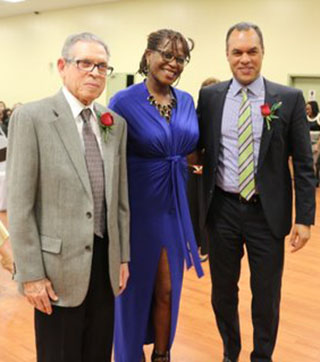
Peter Sloly, right, seen with his father, Michael, and actress and television host, Sharon Campbell. Photo by Kingsley Gilliam.
“My dad paused and thought, and I could literally see him mentally replaying his middle son’s 49 years of life, from wearing short pants as a school boy in Jamaica, to wearing the Canadian national soccer team uniform as a teenager, to wearing a deputy chief’s uniform as a grown man. And then he looked me, right in the eye as he tends to do, and he said, quite simply, and he used the word that’s been used many times tonight. He said, Peter you made an impact, a positive impact.
“He told me that I made an impact on soccer games that I played in, and on the teammates that I played with, and on the teams that I led. He told me that I made an impact on the social justice issues that I championed, on the police officers and the community members that I worked with, and on the policing operations and peacekeeping missions that I led. Some may want to dispute this loving assessment of a son by his a father, but I’m sure few will dispute the fatherly advice that he gave me – wherever God places you do your best to make a positive impact.”
The retired deputy chief said, the Jamaican Canadian Association (JCA) is all about making a positive impact.
“The Canadian part of the JCA represents the fact that, like the Irish, this great country of Canada took us in and provided us with the opportunity to work with all the other immigrants in this land of immigrants, to make a positive impact on the country of Canada. The Jamaica part of the JCA represents the big impact that Jamaicans have made at home, in Canada, and around the world.”
Sloly referenced Nanny of the Maroons, who defeated the military might of the British Empire; Marcus Garvey, who championed the emancipation of slaves; Bob Marley, whose music helped millions of people around the world to emancipate their minds from mental slavery.
“We all know that the ability to make a positive impact is in all of us. We also know that we’re more likely to make an impact on the things that we care about and, for the past 27 years, it just so happened that the good Lord allowed me to make a positive impact on things that I care most about.”
He listed those things as: helping all police members and all community members in all neighbourhoods to be better and safer; serving and protecting the most vulnerable people in society like the youth; and solving the most vexing social justice issues confronting society, like carding, like helping to build trust between the police and the community and to build peace around the world through UN missions.
Sloly said, he was also positively impacted by others in his police career, like Kenneth Mark, a young Black student who worked part time, who cared about his family and his community enough to protect the kids in his neighbourhood against the local gang.
He said, Mark was attacked and shot by the local gang and went to testify against those gang members. While he was walking to work they hunted him down and they executed him.
“His personal courage, his service, his self-sacrifice inspired me. I was impacted by people, like Dudley Laws, who led marches in the streets to educate the broader society. He educated the broader society on the reality of injustice in the justice system and he ultimately achieved a greater level of justice, not just for Blacks, for all marginalized and racialized communities.
He said, he was inspired by people like Larry McLarty, the first Black police officer in Toronto; Terry James, the first Black female officer promoted to supervisor; and Karl Davis, the first Black promoted to senior officer.
“Sonia Thomas, the first Black female officer promoted to senior officer. Who can’t be inspired by Keith Forde, the first Black deputy chief and this should be noted because it is history, it’s a true first, a real big first — recently retired Winnipeg Police Chief, Devon Clunis, the first Black police Chief in all of Canada.”
Sloly said, these are some of the brave Black trailblazers who broke through glass ceilings for people like him to have a better chance to succeed in policing.
He said, it is not just about the Blacks in policing, but it is about the rainbow of colours and diversity that represents the city.
“Some of you can imagine, but none of you can know how, difficult it is to put on your uniform once a day, but to never be able to take off your skin. Some of you can imagine what it’s like to keep your values and your faith when you’re confronted by things that test your values and your faith,” he said, veering away from his script.
He told those in attendance that he is inspired “by people like you and all the countless quiet heroes across this city, and around this country, who make a positive impact on the lives of others without any praise or any pay, people like you who just do it because it’s the right thing to do.”
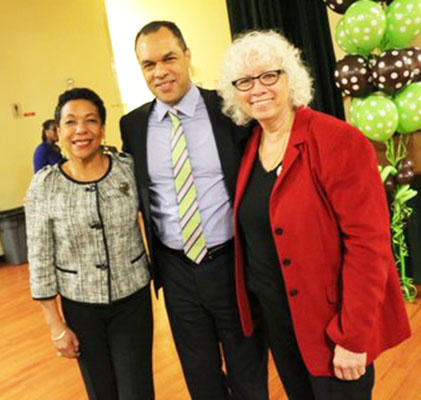
Lorna King (left), Director of P.A.C.E. (Canada) and Diana Burke, Chair of the organisation’s Adopt-a-School Committee, flank Peter Sloly. Photo credit: Kingsley Gilliam.
“Some people say I didn’t get the top cop job because I was too smart, too honest, too educated, too ambitious and too confident. I don’t know if I was actually all of those things, but you’re damn right I tried to be all of those things. I tried because those are the aspirations of my race, those are the foundations of the history of progress in the entire human race, those are the examples set by the Jamaican national heroes, those are the expectations of immigrants who come to my Canadian homeland, those are the values of my parents that my family taught me, those are the standards that I try to demonstrate and set for my own children. That is why I seek to work in places where my values and my talents and my innovation are accepted and, in fact, advanced.”
“And, it’s also why I will never seek an office that requires any less than the absolute pursuit of excellence.”
A presentation of proceeds from the event was made to Marcia Brown of the Trust 15 Youth Support Organization.
“This lady and her family and her community, Marcia is literally saving and transforming lives of so many young people in our community. She has sacrificed her own family’s wellbeing, her own personal finances and even her own health, to build hope in the face of death and despair,” said Sloly, trying hard to choke back tears.
Sloly, 49, was lionized for his integrity, community involvement, outspokenness, creativity and innovation – for being someone who thinks outside the box, a refrain heard throughout the night.
Ojo Tewogbade, a retired police officer and community advocate, who is currently a chaplain of the Toronto Police Service (TPS) invoked the many names of God – Jehovah-Jireh(The Lord who provides), Jehovah-Rapha(The Lord who heals), Jehovah-Nissi(The Lord our banner), and more — to guide the retired deputy chief in his life.
Maureen Ennis, interim president of the Jamaican Canadian Association, said Sloly was considered one of the more progressive voices among leadership in the force.
Kenton Chance, president of the Association of Black Law Enforcers, said ABLE was founded on the vision of law enforcement professionals who adopted respect, courtesy, service and professionalism as core values to guide its members and its work.
“Peter is a prime example of a member of law enforcement who has demonstrated these core values throughout his career, and is a true representation of the community he has served for over 27 years.”
Chance noted, that Sloly has been bestowed a lifetime membership with ABLE.
“The Government of Jamaica is very pleased to celebrate and to thank former Deputy Chief Sloly for his 27 years of unwavering and distinguished service to the City of Toronto,” said Aliecia Taylor, Jamaica’s consul.
“Throughout his tenure, he remained committed, loyal and offered unfailing support to our diverse communities,” she said.
Keith Forde, retired deputy chief, started his comments with a rhetorical question – Has the universe unfolded as it should in relation to Peter Sloly? – which he hoped would become a little clearer at the end of his two-and-a-half minute presentation.
“As a community, I think we take 12 steps forward and 14 steps backward. My friends, I submit to you that is not progress,” he said.
Forde said, policing could be a very lonely job, especially as you rise through the rank and one has to depend on one’s family, which must always come first.
“I want to thank Peter for his creativity in policing. This creativity that he’s brought into policing has made a lot of people uneasy. It has even made some people insecure because he’s not expected to be so creative. He’s not supposed to think outside the box,” said Forde.
Forde said, when he started rising through the rank “they started to try to put me in a box but I wouldn’t go into that box, because I couldn’t get into that box whether they want me to get in that box.”
Speaking publicly about this for the first time, Forde said, in 2004, when the issue of carding was raging all over the city, four of them as Black police officers – Peter Sloly, Karl Davis, David McLeod and himself – held meetings at his office at the police college to strategize, sometimes into the wee hours of the morning.
He said, on one occasion, Sloly was suffering from severe back pain and would lie on his back on the floor in his office giving his input.
“We decided that we had to go to the chief and the service and tell them, ‘Fantino what you’re talking was wrong, you know racial profiling exists.’ And we’ve always kept these things internal,” said Forde.
He said, when the four of them went, they realized that it could be the end of their careers, but it spoke to the core of who they were/who they are.
“These are things that promotion can never supersede. Your conscience has to be your guide in those cases. We stepped forward to the plate.”
Forde said, he was the one dealing with Julian Fantino, who would hang up the phone on him, and he would call Fantino back and hang up the phone on him, because he would not accept that behaviour from anyone.
They were all threatened and others who had planned to join them backed out because their jobs were also threatened.
“But the four of us soldiered on and we confronted the issue. I believe that this had a real impact on Julian Fantino’s time not being renewed. I believe this had a real impact on this service right from there.”
He said, that confrontation had far-reaching ramifications on policing within the service.
Thinking about what the visible minority officers should take away from what he said earlier, Forde said: “We have to think for ourselves. We have to have confidence in ourselves, and we cannot let anyone define who we are.”
Speaking about the police association that had gone after Sloly, Forde said, he went and spoke to its president, Mike McCormack, but at times, he felt that its going after the deputy chief became very personal.
“You cannot convince me, to the contrary, when Peter is no longer at the service and his picture is placed on the front page of the magazine in a derogatory manner. Now visible minorities on the job, how do you address this? I don’t have time to tell you now, how you should address this, but what I can tell you, clearly, silence cannot be the answer.”
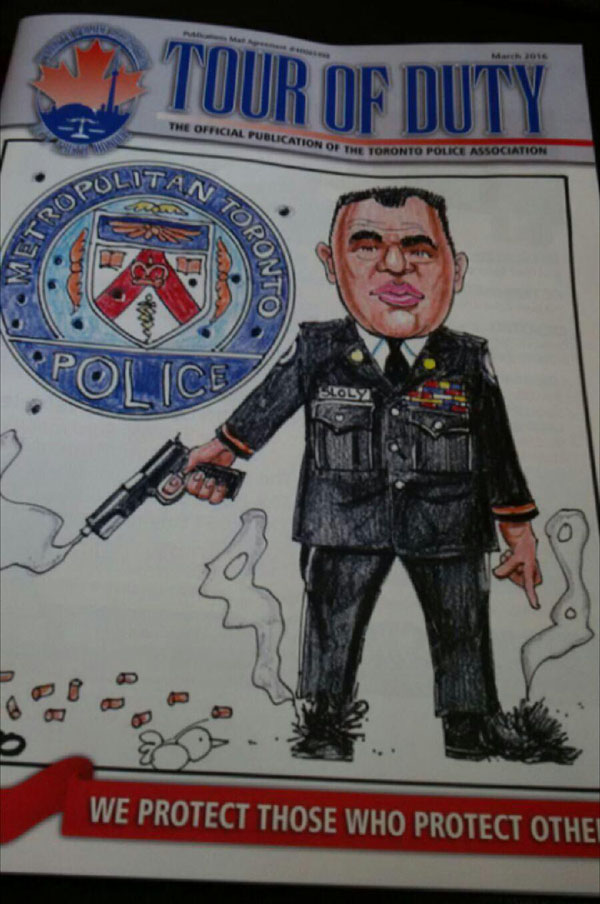
A screenshot of the Toronto Police Association magazine — Tour of Duty — cover, depicting a derogatory caricature of retired TPS deputy Chief, Peter Sloly, having, apparently, shot himself in his feet.
Forde said, once he walked off the job of policing, he told himself that he would be rarely seen at police events, rarely speak publicly on any issue on policing, because he believes that policing is hard enough as it is to have a person like him on the outside throwing boulders at it.
“Let the police continue to evolve and let the people that take the mantle after me be the ones to see,” said Forde, noting, that he had spoken twice since he retired in five-and-a-half years.
He said, he spoke about Alok Mukerjee, the chair of the Police Services Board, who headed it for 10 years and who the police association accused of hating policing.
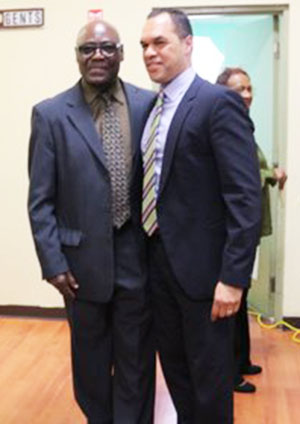
Peter Sloly and Keith Forde worked closely to advance racially-inclusive changes in the TPS. Photo by Kingsley Gilliam.
The other time he spoke publicly was about Sloly, because he found it “galling” what he was hearing.
“People say Peter cannot work with another Black man. In 2005, I got promoted to deputy; Peter got promoted to staff superintendent. We worked together. We worked so successfully together the face of the organization was changed by us and the HR,” Forde said, noting, that the good thing they had at the time was a boss that believed in what they were doing. At this time the new chief was Bill Blair.
Forde believes he and Sloly had a lot of significant impact on recruitment, hiring, promotion and training.
He said, when Sloly came into the police command with him as a deputy, they were two of the four deputies and the chief in the leadership.
Forde said, many times, when they all met as senior command, he felt like sinking under the table when he heard some of the things that Sloly was saying because they were bold.
“I thought I was bold, but Peter was 10 times bolder than I thought I was.”
Forde thanked Sloly for the PACER report, saying, “Peter, thanks for doing what is right and thanks for doing what is just.”
“Peter, you’ll be an excellent asset and a valuable contribution to any organization. I say this because of your great vision, your vast wisdom, your innovative thinking and your can-do attitude. May God inspire you to greater heights.”
Valarie Steele, president of the Jamaican Diaspora Canada Foundation and member of the Black Action Defense Committee (BAD-C) said, she rejoiced when Sloly retired, and decried a caricature of Sloly that the police association has on the cover of its magazine. It shows the deputy chief with a gun having seemingly shot himself in both feet.

Valerie Steel displays the Toronto Police Association cover, featuring a derogatory caricature of Sloly that she found “disrespectful”. Photo by Kingsley Gilliam.
“And when I saw the disrespect that your union visited on you, anger, there’s no word in the English language to describe my feeling because you’re better than this,” she said, holding up the magazine.
Steele thanked him for all of the body blows that he has taken on behalf of communities, especially the African Canadian community.
“We are here to show our love for you and appreciation for your decades of hard work and the fact that you never turned your back on your community. And, you should be very proud, sir, that you are definitely known to us.”
Steele said, the TPS will have to change and promised that “many of us, we are never going to stop until that happens, and we will go after any and every politician that makes policies that support the status quo.”
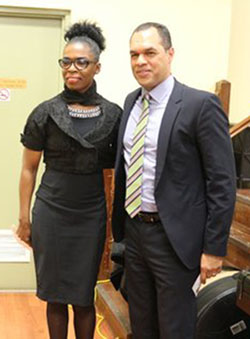
Pauline Christian, President of the BBPA, pose for a photo with Peter Sloly. Photo by Kingsley Gilliam.
Pauline Christian, president of the Black Business and Professional Association, said Deputy Chief Sloly has exemplified a distinguished career, raised the bar, and mentored many to follow.
“Deputy Chief Sloly, albeit we truly regret to see you leave this station, in time as we stand on the verge of repositioning, realigning, collaborating and re-strategizing for transformational change in the space of law enforcement, we want to let you know that we are cognizant that we will never fully understand when amazing individuals like you choose to make a significant move in your career journey, but we want to respect it, as we believe that you’re truly convicted by your spirit of humanity, goodwill and community and we will better understand it when it is the right time.”
She said, Sloly’s devotion to the community and TPS is very impressive and during his tenure the service gained local, national and international notoriety, “especially as it relates to social media strategy, diversity management, community mobilization, public trust and partnership and the list goes on.”
Christian said, Sloly served on the BBPA’s national scholarship board of trustees and always made a donation to the scholarship fund over the years.
Jenny Gumbs, president of Tropicana Community Services, said Sloly has overcome rigorous challenges and progressed to the rank of deputy chief of police, “but most amazingly a true leader and a friend of the community.”
She said, when she was consul general of Grenada and member of the consular corps, she had many opportunities to interact with the deputy chief.
“He was always readily accessible and cordial whenever he was approached on any matter and was consistent in proffering guidance and assistance with so much professionalism.”
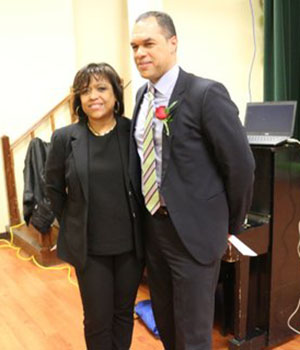
Jenny Gumbs, President of Tropicana Community Services Organisation, and Peter Sloly. Photo credit: Kingsley Gilliam.
Gumbs read a letter from city councillor, Michael Thompson, in which he said, he first met Sloly in 2004 when he was a new councillor trying to draw attention to a rising tide of gun violence in the city.
“I was impressed with his intelligence, his down-to-earth approach to problems and his ability to work with others to find solutions to difficult problems. Over the years and throughout my time on the Police Services Board my respect for him grew. His passion for public service, his fierce dedication to excellence and his courage in fighting for change within an organization stuck in the mind of outdated ideas, has earned my admiration and my trust. Whatever Peter decides to do and wherever he chooses to go he will undoubtedly make exceptional contributions to any organization that is fortunate enough to benefit from his leadership,” said Thompson in his letter.
David Sloly, older brother of Peter, speaking on behalf of their parents, Michael and Authurine, extended thanks to everyone for the tribute to Peter, who is the middle sibling. Matthew is the youngest.
“Like our dad, who was a lawyer in Jamaica, Peter is as straight as an arrow. Our father set that example of integrity, of being dependable and honourable in his professional career and his life as a father, a husband, a son and brother to his family. Like our mother, a former social worker, Peter is a caregiver who has the ability to sense and feel where help is needed before it’s even asked for. He’s been a gentle giant in our family and nowhere else has that been exemplary as in how he looked after our grandparents in their waning years.”
David said, there is a longstanding tradition of community service in the family which goes back to the time of emancipation in Jamaica and, more recently, to Roger Mais, a descendant of those activists on behalf of emancipation.
Mais was a novelist, playwright, artist, journalist and social activist whose books tell of the struggles of the poor and disenfranchised people in Jamaica in the city slums and in the countryside.
He said, Mais was a torchbearer for the independence movement in Jamaica and Norman Manley described Mais’ sister, Jesse, David’s paternal grandmother, as someone whose “devotion and support contributed to the artistic, literary and political heights that Roger attained during his short life.”
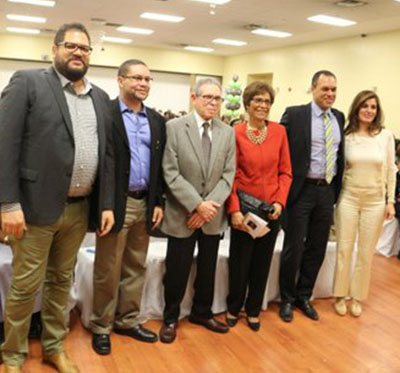
Peter Sloly, second from right, was joined at the event by, from left to right, his brothers, Matthew and David, his father, Michael, mother,Authurine, and his wife, Leyla. Photo credit: Kingsley Gilliam.
David
David
David said, his maternal grandmother was a longtime volunteer with the YWCA and helped to teach many young women the basics of shorthand and typing.
He said, his mother and his father’s brother worked together on two sides of social welfare in Jamaica.
His mother ran a centre which was established by the Catholic Church and supported by Jamaica’s Jewish community. Her work was focused on the core of western Kingston.
David’s uncle, Dennis, was part of a group of legal aid workers, of lawyers who provided free legal aid in a time when Jamaica had no legal aid services.
Django the Pan Man and The Chitans – a family of 4 young people who are singers – provided the entertainment.
Boutonnières were pinned onto Peter Sloly and his father, Michael, while his wife, Leyla, and mother, Authurine, received bouquets.
Chris Campbell of the Carpenters Union and Ned Blair of the Organization of Black Tradesmen and Tradeswomen of Ontario also made presentations to Sloly.
Singer, Queen Banton, sang the Canadian and Jamaican national anthems followed by a prayer by Ojo Tewogbade.
Itah Sadu was the dynamic emcee and Leo Campbell, interim vice president of the JCA, made the opening remarks.
The event was put on by several African Caribbean Canadian organizations: the Association of Black Law Enforcers (ABLE); the African Canadian Legal Clinic (ACLC); the Alliance of Jamaica Alumni Associations; the Black Action Defense Committee (BAD-C); the Black Business and Professional Association (BBPA); the Jamaican Canadian Association (JCA); the Jamaican Diaspora Canada Foundation; Project Advancement of Childhood Education; Tropicana Community Services Organisation; and First Fridays.
 Pride News Canada's Leader In African Canadian & Caribbean News, Views & Lifestyle
Pride News Canada's Leader In African Canadian & Caribbean News, Views & Lifestyle

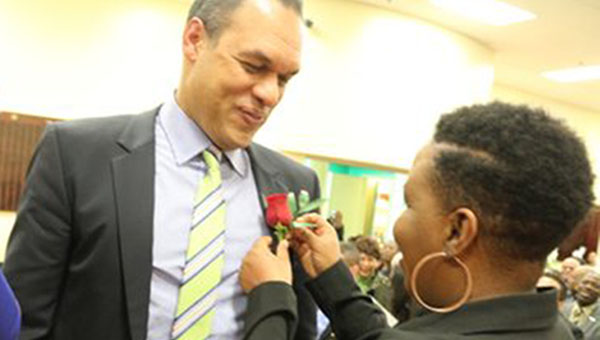
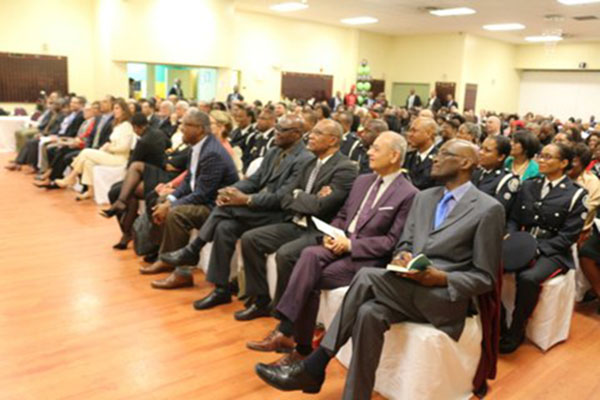
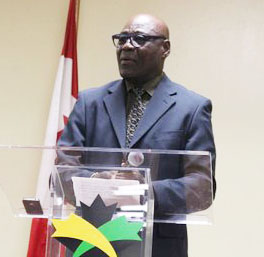




What a trememndous celebration for a job well done. The tributes fully illustrated the qualities of the man – Peter Sloly. Now the time has come, to see how his knowledge, skills and competencies can be used for the benefit of all Canadians. May he prosper in harmony, peace, and success in what ever he chooses as his next career. Our students of GTA and Canadian history will always reflect on Peter’s sojourn. Stay posted, because I can assure you, that the very best is yet to come